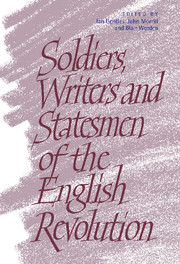Book contents
- Frontmatter
- Contents
- Preface
- Austin Woolrych: an appreciation
- 1 Secret alliance and Protestant agitation in two kingdoms: the early Caroline background to the Irish Rebellion of 1641
- 2 Of armies and architecture: the employments of Robert Scawen
- 3 George Digby, Royalist intrigue and the collapse of the cause
- 4 The iconography of revolution: England 1642–1649
- 5 The casualties of war: treatment of the dead and wounded in the English Civil War
- 6 ‘A bastard kind of militia’, localism, and tactics in the second civil war
- 7 Cromwell's commissioners for preserving the peace of the Commonwealth: a Staffordshire case study
- 8 Colonel Gervase Benson, Captain John Archer, and the corporation of Kendal, c. 1644—c. 1655
- 9 Repacifying the polity: the responses of Hobbes and Harrington to the ‘crisis of the common law’
- 10 Equality in an unequal commonwealth: James Harrington's republicanism and the meaning of equality
- 11 John Milton and Oliver Cromwell
- 12 From pillar to post: Milton and the attack on republican humanism at the Restoration
- 13 ‘They that pursew perfaction on earth …’: the political progress of Robert Overton
- 14 Locke no Leveller
- A bibliography of the writings of Austin Woolrych, 1955-95
- Index
6 - ‘A bastard kind of militia’, localism, and tactics in the second civil war
Published online by Cambridge University Press: 10 November 2009
- Frontmatter
- Contents
- Preface
- Austin Woolrych: an appreciation
- 1 Secret alliance and Protestant agitation in two kingdoms: the early Caroline background to the Irish Rebellion of 1641
- 2 Of armies and architecture: the employments of Robert Scawen
- 3 George Digby, Royalist intrigue and the collapse of the cause
- 4 The iconography of revolution: England 1642–1649
- 5 The casualties of war: treatment of the dead and wounded in the English Civil War
- 6 ‘A bastard kind of militia’, localism, and tactics in the second civil war
- 7 Cromwell's commissioners for preserving the peace of the Commonwealth: a Staffordshire case study
- 8 Colonel Gervase Benson, Captain John Archer, and the corporation of Kendal, c. 1644—c. 1655
- 9 Repacifying the polity: the responses of Hobbes and Harrington to the ‘crisis of the common law’
- 10 Equality in an unequal commonwealth: James Harrington's republicanism and the meaning of equality
- 11 John Milton and Oliver Cromwell
- 12 From pillar to post: Milton and the attack on republican humanism at the Restoration
- 13 ‘They that pursew perfaction on earth …’: the political progress of Robert Overton
- 14 Locke no Leveller
- A bibliography of the writings of Austin Woolrych, 1955-95
- Index
Summary
In the spring of 1648, the English parliament prepared for a new war. It had spent the previous year trying to secure a peace settlement and disband its armies. The Scots were about to march south again, now in alliance with King Charles I and, in England and Wales, people anxious to see an end to their hardships rose up in armed frustration. Parliament strengthened strategic garrisons, such as Berwick, and ‘resolving to reinforce the militia of each county’, it 'sent down some of their members to give life to the preparations’. On 25 May, the Commons proposed that the Derby House Committee issue commissions for the raising of county forces by persons of known fidelity to the parliament. The measure did not pass, though an exception was made in the case of Edmund Ludlow's county of Wiltshire. Ludlow agreed to raise two artillery regiments and one of cavalry.
Gentry frustration at the difficulties which persisted in obtaining a lasting settlement covered the whole range of political opinions. At one end of the spectrum was royalist revivalism: there were armed demonstrations against taxation levels, calls for the New Model Army to be disbanded and for a personal treaty with Charles. These were particularly a feature of Wales and the south-eastern counties of England. At the other end of the spectrum was direct action taken by county gentlemen who were among the most hawkish of the parliamentarians.
- Type
- Chapter
- Information
- Soldiers, Writers and Statesmen of the English Revolution , pp. 133 - 150Publisher: Cambridge University PressPrint publication year: 1998



